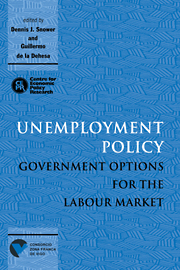Book contents
- Frontmatter
- Contents
- List of figures
- List of tables
- Preface
- Acknowledgements
- List of conference participants
- 1 Introduction
- PART ONE GENERAL POLICY ISSUES
- PART TWO DEMAND MANAGEMENT AND SUPPLY-SIDE POLICY
- PART THREE SUBSIDISING EMPLOYMENT AND TRAINING
- 6 The simple economics of benefit transfers
- Discussion
- Discussion
- 7 Wage subsidy programmes: alternative designs
- Discussion
- Discussion
- 8 Technological development, competition from low-wage economies and low-skilled unemployment
- Discussion
- 9 Macroeconomic and policy implications of shifts in the relative demand for skills
- Discussion
- 10 Would cutting payroll taxes on the unskilled have a significant impact on unemployment?
- Discussion
- 11 Preventing long-term unemployment: an economic analysis
- Discussion
- Discussion
- PART FOUR LABOUR MARKET REGULATIONS
- PART FIVE POLICY, JOB REALLOCATION AND THE UNEMPLOYMENT–PRODUCTIVITY RELATION
- PART SIX COMPARING UNEMPLOYMENT POLICIES
- Index
Discussion
Published online by Cambridge University Press: 07 September 2010
- Frontmatter
- Contents
- List of figures
- List of tables
- Preface
- Acknowledgements
- List of conference participants
- 1 Introduction
- PART ONE GENERAL POLICY ISSUES
- PART TWO DEMAND MANAGEMENT AND SUPPLY-SIDE POLICY
- PART THREE SUBSIDISING EMPLOYMENT AND TRAINING
- 6 The simple economics of benefit transfers
- Discussion
- Discussion
- 7 Wage subsidy programmes: alternative designs
- Discussion
- Discussion
- 8 Technological development, competition from low-wage economies and low-skilled unemployment
- Discussion
- 9 Macroeconomic and policy implications of shifts in the relative demand for skills
- Discussion
- 10 Would cutting payroll taxes on the unskilled have a significant impact on unemployment?
- Discussion
- 11 Preventing long-term unemployment: an economic analysis
- Discussion
- Discussion
- PART FOUR LABOUR MARKET REGULATIONS
- PART FIVE POLICY, JOB REALLOCATION AND THE UNEMPLOYMENT–PRODUCTIVITY RELATION
- PART SIX COMPARING UNEMPLOYMENT POLICIES
- Index
Summary
In July 1993, a bright girl graduated from the Business School at Louvain-la-Neuve and set off to spend the summer in Santander, expecting to upgrade her knowledge of Spanish and thereby her career prospects. Before departure, she routinely registered as a job seeker. Upon her return, she was offered a three-month job as research assistant, with an understanding that she could simultaneously prospect the job market. She accepted and reported at the local employment office. To her surprise, a well-meaning counsellor told her:
– ‘You should not take that temporary job. Please think about your future!’
– What about my future?'
– ‘It hinges on unemployment benefits. If you do not find another job within three months, you will lose your entitlement. Besides you need to remain unemployed for six consecutive months in order to qualify for the latest Benefits Transfer Programme – which is fast becoming a prerequisite for the first job.’
Unlike the fable about ‘the farmer, his son and the Jaguar’, this is a true anecdote – down to the words ‘think about your future’. The Youth Employment Programme of the Belgian government very much resembles the Snower BTP proposal in chapter 6, on a targeted basis. Firms hiring a worker of less than 26 years of age who has been unemployed for six months or more is exempted from employers' social insurance contributions for 2¼ years.
- Type
- Chapter
- Information
- Unemployment PolicyGovernment Options for the Labour Market, pp. 202 - 205Publisher: Cambridge University PressPrint publication year: 1997



